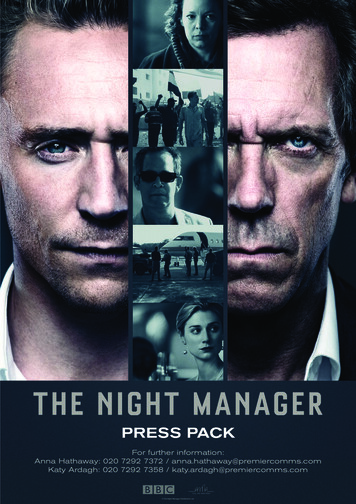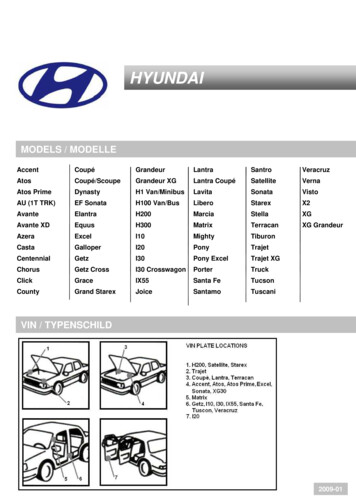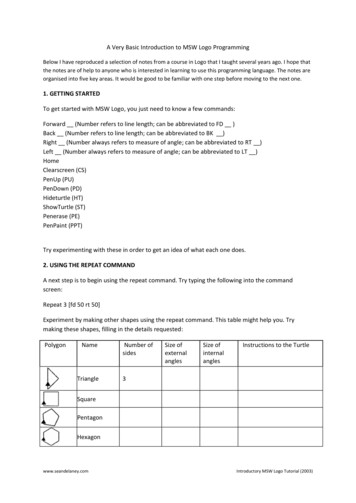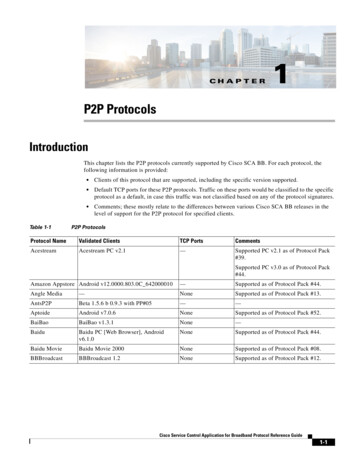
Transcription
PRESS PACKFor further information:Anna Hathaway: 020 7292 7372 / anna.hathaway@premiercomms.comKaty Ardagh: 020 7292 7358 / katy.ardagh@premiercomms.com The Night Manager Distribution Ltd.
CONTENTSLETTER FROM JOHN LE CARRÉ3SYNOPSIS5CHARACTERS6INTERVIEW: SUSANNE BIER,EXECUTIVE PRODUCER/DIRECTOR24EPISODES26CAST LIST27CAST BIOGRAPHIES28PRODUCTION BIOGRAPHIES29PRODUCTION CREDITS31
LETTER BYJOHNLECARRÉIt’s been one of the unexpected miracles of my writinglife: a novel I had written more than twenty years ago,buried deep in the archive of a major movie companythat had bought the rights but never got around tomaking the movie, suddenly spirited back to life andre-told for our times. And how!In the novel, my chief British spook had been a mannamed Burr – a rough-cut, ponderous, no nonsensefellow, but a man for all that, and a throwback to myown distant days in the secret world when femaleofficers were, to say the very least, a rarity.But did we really want this in 2015: one white malemiddle-aged man pitched against another whitemiddle-aged man, and using a third, younger, whitemiddleaged man as his weapon of choice?We didn’t. So enter instead – to loud applause frommyself – the delightful Mrs. Burr, first name Angela,shrewd, gutsy, in turn dour and sparkling and in life, asin the screenplay, majestically pregnant.And then, as Hemingway might say, there was thestory. For the novel, I had set much of the drama on theluxury yacht of my arch villain and illegal arms dealerextraordinaire, Richard Roper. But luxury yachtscost the earth to hire, and in movies – unless you’regoing to sink them – tend to become repetitive andclaustrophobic. Far better to give him a billionaire’sisland in the sun with a palatial Gatsby-style villa at itscentre and a sprinkling of cottages for his underlingsand protectors.On the northern reaches of the Spanish island ofMajorca, we found just such a rich man’s paradise,and moved Richard Roper into it, together with hismuch younger, peerlessly beautiful, disconcertinglyintelligent trophy mistress, Jed.But we still had the story to tell. And we were stilldetermined to tell it about today. Twenty-five yearsago, the novel’s plot had taken me – and my fictionalprotagonist Jonathan Pine – from West Cornwall tothe mining town of Val d’Or in Northern Quebec,to Panama City and the forested mountains of theDarien.The purpose of these seemingly disconnectedwanderings had been to frustrate the sale of a hugeconsignment of state-of-the-art weaponry to nervousdrug barons of Central America. Their supplier? Mr.Richard Roper, my villain.But by 2015 the war on drugs had run and run, endlessmovies had portrayed it, and the hot market for illegalarms had in the meantime moved to the bloodlands ofthe Middle East, to Syria, Libya and above all Egypt,where democracy even now is being shot down everytime it lifts its head.I never wanted the film of the book. Actually I neverdo. I wanted the film of the film. And we all did. AllI asked was that the central interplay between ourprotagonists remain intact, and the narrative arc ofthe original story – never mind where it’s set – bebroadly the narrative arc of the novel, exploring thesame human tensions and appetites, and resolving thedramatic conflict in the same broad terms.As to Mrs. Burr: well, of course, I dearly wish I hadwritten her into the novel instead of her ponderoushusband. But I didn’t. So all I can do is welcome her tothe family, and thank my lucky stars that the writer andproducers had the wit to conjure her into life.Of Hugh Laurie’s performance – Tom Hiddleston’s– Olivia Colman’s – Tom Hollander’s – ElizabethDebicki’s – it goes on and on – above all of SusanneBier’s superb and uncompromising direction – inshort of the whole symphony that the six hours of“The Night Manager” have become – I can only saythat they bring back those glory days in the seventieswhen I was watching the BBC’s “Tinker Tailor SoldierSpy” being magicked to life by Alec Guinness and theinspired cast that surrounded him.And finally, a collegial salute to our tireless andwonderfully inventive screenwriter, David Farr. In thebeginning, as ever, was the word.
“ANYONECAN BETRAYA N Y O N E .”RICHARD ROPER
SYNOPSISA contemporary interpretation of John le Carré’s espionage drama – and the first televisionadaptation of a le Carré novel in more than 20 years – “The Night Manager” brings togetherlove, loss and revenge in a complex story of modern criminality. The series follows formerBritish soldier Jonathan Pine (Tom Hiddleston) who is recruited by intelligence operativeAngela Burr (Olivia Colman) to infiltrate the inner circle of international businessman RichardOnslow Roper (Hugh Laurie) and detonate the unholy alliance he has ministered between theintelligence community and the secret arms trade. To get to the heart of Roper’s vast empire,Pine must withstand the suspicious interrogations of his venal chief of staff Major Corkoran(Tom Hollander) and the allure of his beautiful girlfriend Jed (Elizabeth Debicki). In his questto do the right thing, he must first become a criminal himself.5
TOMHIDDLESTONASJONATHANPINEJonathan Pine is an ex-soldier, who fought in Iraq and now lives in retreat fromlife, and himself, as a hotel night porter. A self-exiled creature of the night,and perpetual escapee from emotional entanglement, Pine’s conscience ispricked when his act of disclosing documents confidentially entrusted to himby a hotel guest results in her death. What begins as a quest for atonementbecomes a quest for his own soul, as he enters the inner sanctum of RichardRoper and navigates the shadowy recesses of his world.
Could you start by telling us about yourcharacter in The Night Manager?I play Jonathan Pine who, at the beginning of thestory, is a lost soul. He is the night manger of a 5-Starhotel in the ski resort of Zermatt in the Swiss Alps,living an almost monastic life, literally and figurativelyburied in snow, silence and darkness. I think he isa mystery to all men and to himself – the uniformand the face he prepares to meet others is a maskthat protects him from having to know who he is.Behind an immaculate three-piece suit, immaculatetie, polished black shoes and impeccable manners, healmost has no character because he is filled with guiltand shame because of what has happened in his past.He is a former soldier who has served two tours inIraq, so though he has disbanded from the military,he is still a serviceman – he is just serving in the hotelnow as opposed to in the army.What drew you to this exciting project?I was sent the first episode by my London agent,telling me that Simon and Stephen Cornwell – John leCarré’s sons – were seeing who might be interested ina television adaptation of The Night Manager. I readthe first episode, and from the very beginning, I wascompletely hooked into the story and the character. Ifell in love with it immediately.Were you familiar with the novel beforegetting involved in the drama?I hadn’t read the novel before, but as soon as I’d readthe script, I sought the novel out. I think John le Carréoccupies a unique position in British literature andstorytelling. I think he has a singular authority on thesubject matter having been in the circus himself, asthey say. He is a deeply gifted narrative storyteller anda master of his art, the espionage thriller. I think thereason any actor would be drawn to an adaptationof his material is the characters, which are incrediblycomplex, incredibly rich and as surprising andcontradictory as real people are.has such an incredibly instinctive authority over whatshe will allow in terms of what she believes, which isso important in a story like this. It is very easy in aspy drama – or in anything that requires a proceduralcohesion – for people to make compromises becauseit looks good or it’s easier for the schedule. The excuseis that the audience won’t see it, but the audience willsee it and so does she. With Susanne, the stitching is sofine and intricately woven that there are no loop holesand no fuzzy plot points – she doesn’t let anything goand is unbelievably rigorous about story and piecingtogether the puzzle in an appropriate way so that itreally holds as a narrative.What attracted you to the character ofJonathan Pine?The character appealed to me because I knew, as anactor, I was going to have to operate at the highestlevel of my intellectual and physical ability becausehe is a field agent, but also has to be smart enoughto go undercover. I found his nobility, courage andmorality very appealing – he is actually a very moralcharacter and is filled with le Carré’s own moralauthority about the world. There is a certain line thatyou can feel underneath all of le Carré’s work whichis a very robust moral foundation: a belief in rightand wrong; in decency and its opposite.Why does Pine feel compelled to help Burrand risk his life by going undercover to exposeRoper?I think Jonathan is looking for a reason to live. Ofcourse, he is physically alive and he has a job, butis hidden away on a mountain in Switzerland andworking nights in a hotel. I don’t think it is a vocation,I think it’s a comfort because the discipline and thepatience and the manner required is something thatis familiar to him from the army. When Burr comesto find Pine, she reawakens something at the heart ofhim which has been lying dormant for some time andwhich is, I think, his moral fibre and anger. It is moralanger that is shared, as far as I can tell, by John leCarré, which is that there are people doing things inthis world who should be stopped. And that somehowhe feels brave enough to take on.This is an epic production with an incredibleamount of locations. Can you talk about somethe locations you have visited during thisproduction?The locations have been amazing, truly. This storyhas enormous scale and ambition and the locationswe have been to have added so much texture to that.The Night Manager, as a narrative, has this incredibleinternational breadth, jumping from Cairo in theArab Spring to the Swiss Alps, London and Devon. Inthe book, there are scenes in the Bahamas and Cyprusbut in our story we have made it Mallorca and theTurkish-Syrian border, Istanbul and Monaco. OftenI turned up on set and had a very reassuring feelingas my imagination didn’t have to supply anythingelse because I had been placed immediately in acompletely believable context for where the characteris. Each location has been so immaculately designedand so correctly chosen it often took our breath away.What has Academy Award-winning director,Susanne Bier brought to the project?Susanne is a crusader for the truth and has anextraordinarily rigorous compass for what seemsnatural and plausible as sequential storytelling. Idon’t think I have ever worked with a director whoWhat can you tell us about Richard Roper?Richard Roper lives a very luxurious and appealinglife which is funded by proceeds from arms deals tothe highest bidder. He is living this extraordinarylife with private jets, private yachts and houses inthe Mediterranean. I think Roper is drawn to Pinebecause they are quite similar in lots of ways. I thinkthere is something that often runs through le Carré’swork which is a particular strain of Englishnessperhaps – a shared frame of reference, sense ofhumour and understanding of the world – that oftencomes through the cracks.Roper is a very charming, very charismatic, affable,funny, warm, intelligent, sophisticated Englishman.Someone whose stories you want to listen to, who’sa fantastic dinner party guest, fluent and charmingpublic speaker, and has an enormous power for good.The reason he chooses to use that power for ill is whyle Carré - and, in turn, Pine – is so angry with him.7
“ I DO N ’T TEN D TOSETTL E AN YWH E R ETO O L O N G.IT ’S O N E O FTH E ATTRACTIONSO F TH E TRADE.”JONATHAN PINE
HUGHLAURIEASRICHARDROPERRichard Roper is well born, well-educated, has grace and has charm.But behind the public mask – billionaire businessman, entrepreneur,philanthropist, gentleman – lurks a Mephistopheles. The worst man inthe world has built an empire from his trade in human life, selling armsto the highest bidder and purchasing whatever souls he can along the way.When Pine saves his son – his love for him, Roper’s only weakness – Roperwelcomes him into his family. Which may just prove his undoing.10
How long ago did you get involved with TheNight Manager and what was it that attractedyou to the story in the first place?I fell in love with the book when I first read it back in1993. I’d worshipped le Carré since I was a teenager not an unusual thing, obviously - and was completelyenthralled by the romance of the secret struggle,the friction between the inner and outer worlds. Butthis story in particular I found endessly intriguing,mythic almost. I’ve absolutely no skill or instinct forproducing, but this was the only time in my life I’veever tried to option a book. As I remember it, I triedto get the rights before I’d finished the third chapter.I was unsuccessful, of course - the great SydneyPollack had jumped on it and wouldn’t let go - but thecharacter of Pine (and yes, back in 1993 I impudentlyimagined myself playing Pine ) is a fascinating one:the errant knight roaming the landscape, lookingfor a cause, a flag to fight for. Better still, to die for. Ithought it was such a beautiful story.Having said all that, I can’t claim any credit for gettingthe thing off the ground. I just told the producers thatI would be happy to take any job on the production,as actor, caterer, anything I could do to make it go – Ijust wanted to be involved with it.This is a contemporary adaptation of thenovel, how does that change the story and fitin with our world right now?I suppose it’s a characteristic of myths, that they’rein some sense eternal. Stories that can stand to betold and retold at any time, in any setting. Usually Iwould say that trying to make things contemporaryis a mug’s game, because events will always overtakeyou. The original story involved an arms dealer– Richard Roper, played by your humble servant –selling weapons to the Colombian drug cartels. Andperhaps the cartels seemed less “relevant” these days.But a couple of months ago, while we were filming,a Mexican military helicopter was shot down with asurface-to-air missile and the Mexican governmentessentially admitted they were at war with thecartels, and had no idea where their weapons werecoming from. So there you go: le Carré writes it, and20 years later, it happens. But in any case, we havetransplanted the story, beginning in Cairo with theArab Spring of 2010 (another event, by the way, thatno one saw coming – for all the CIA satellites circlingover our head, no news organization, no intelligenceagency predicted it) and moving to the present day.David Farr, the writer, has done an incredible job ofreinventing the last third of the story to accommodatea different continent and a very different kind ofconspiracy. I hope that we have been able to give ita sort of contemporary freshness, while retainingsomething of that mythic quality.This is an epic production. Can you talk a littlebit about the locations that were visited?You see, this is why people hate actors – one of thereasons, anyway – because there is no reason why Ishould get to sit in a beautiful place like this. None.Undeserved. We began in Switzerland, which is thesetting for the quiet hotel implied by the title. It’s quitesomething to open your bedroom window and see theMatterhorn staring down at you. A metaphor for theheights we were trying to scale. About a third of thestory takes place in London, which is a metaphor forLondon. I wasn’t actually involved in that part, but Iwent along anyway, just to eat the sandwiches.We then spent six weeks in Morocco, and have beenhere in Mallorca for five weeks. Not a day has goneby without a member of the cast saying, “I can’tbelieve that I am actually here doing this”. It’s ourgood fortune to be playing characters who live a veryluxurious, jet-setty life and that means, in order to doit, we have to live it. It’s hard, it’s gruelling.The director on this project is Susanne Bierwho is an Academy Award winner. What doesshe bring to The Night Manager?Everything. She is The Night Manager. Her vision,her taste, her approach has defined every part ofwhat we are doing, and it’s been an absolute thrillto be a part of. Not to say she and I always agree,because we don’t - in fact the first time we met, oneof the very few things we agreed on was that wewould constantly disagree. But it’s wonderful to be inthe hands of a director with such taste and wit, suchan eye for detail but also for the grand scope of thestory - it encompasses a large period of time, severalcontinents, a huge cast of characters and yet at thesame time it needs to be very detailed. I hope le Carréwon’t mind me saying this, but he writes thoughtsmore than deeds – obviously harder to render on film.He doesn’t tend to do car chases and things blowingup, (although we have our fair share of that) but, forthe most part, the story is detailed, psychological. Itrequires a director with a very specific set of skills andI can’t think of anyone else who could have done itwith such elegance, such panache - or anyone else Iwould have rather done it with, to be honest. It hasbeen an absolute delight, start to finish.At the heart of the story is the dynamicbetween Roper and Pine, can you talk aboutthat dynamic and the dynamic between youand Tom as actors?You’ve used the word dynamic there, I can’t helpnoticing. Hmm, let me see. The character of Pineis a lost soul - I suppose that’s one of the things Iresponded to when I first read the novel and kept onresponding to whenever I’ve read it since. He is noble,courageous, decent, but also lost. He is looking for apurpose, and decides that he will risk his life to takeon an enemy who is described to him by a lover as“the worst man in the world” – that is Roper’s legend,and that’s what I’ve got to try and inhabit. But it’s anambiguous story in as much as Pine’s original goal isto bring down this monster, but at the same time resistthe monster’s charm. The Siren voice, the Medusagaze, choose your mythic power. Because Roper giveshis monstrosity and the evil things he does a kindof logic, even a glamour. There are moments whenPine teeters on the brink of the dark side, when youwonder which way he will go. At the same time youmight wonder whether Roper is teetering too - thatsomewhere inside himself he wants to be caught, tobe betrayed. The audience has to judge for themselveswhere Pine and Roper come close to crossing the linein opposite directions - where Roper might plungethe dagger into his own chest and where Pine mightbecome the very thing he set out to destroy. It’s anabsolutely fascinating exploration, and I think thisabout so much of le Carré’s writing. Some describehim as a spy writer, but his stories so far transcendthe notion of genre; he uses the world of the spy andthe intelligence business to examine some profoundquestions. My God, I hope we can do it justice.When Roper meets Pine in Switzerland,something about him seems to attract himand interest him right away – what do youthink that is?How could anyone not be attracted to TomHiddleston? The question makes no sense. I thinkRoper, for all his villainy and monstrous conspiring, islooking for a kind of aesthetic. He seeks an experiencefar beyond simply making money - a companion withwhom he can share his pleasure and triumph, thejourney of it all, the adventure - and I think in Pinehe identifies an equal. Or maybe a version of himself.At least, he sees someone to whom he can bequeathhis empire. Roper does actually have a young son,played by the fantastic Noah Jupe (watch out for thatname!) who is perhaps too gentle a soul to follow inhis father’s footsteps. Roper is looking for someone toshare the pleasures of his villainy. And even if Pineisn’t villainous, at least he is adrift - the devil is alwayslooking for souls who aren’t anchored after all - andPine is definitely not anchored at the beginning of thestory. And maybe Roper sees a way of exploiting that,not just for his own mechanical purposes but also forthe fun of it. I think he enjoys Pine’s company, hisattitude, his whole affect. I imagine Roper picks thepeople around him very carefully, and in his mindhas assembled a sort of royal court. He has a joker, awarrior, a poet, he wants the various seats around hisroyal table to be filled, and in Pine he sees a fitting andappropriate character who can flesh out his court.One final question about Roper and Jed, youmentioned their relationship, and that he hasworked very hard to keep her separated fromhis business and that gets increasingly hard asthe story goes along.That’s right. I mean Jed is half Roper’s age – goodLord that’s a surprising and unusual thing that youdon’t expect to see in the modern world isn’t it? Wellyes, it seems to be in the makeup of wealthy andsuccessful men - they seem to gather about themselvesyoung and beautiful women, and one imagines thatRoper has a pretty salty past in that regard. But he andJed have been together for a number of years whenwe join the story. I think they are close, that there is agenuine affection between them, but it might be thatRoper actually needs her to remain an innocent - thatmaking her complicit in his actions would tarnish thevery thing he wants to keep separate. Maybe at somelevel he sees Jed as having some sort of redemptivepower precisely because she is not involved. He canhave a purer, gentler relationship with her because herhands are not bloodied by the terrible things he hasdone – or maybe her innocence is another nutrientthat he can feast on. I don’t know, and perhaps hedoesn’t either. I ought to know by now, as we are onlythree days from finishing filming but so many ofthe questions in this story are not easily answerableand one can look at them in so many different ways.The complexity is what makes it so enjoyable.11
OLIVIACOLMANASANGELABURRFrom a shabby office in London’s Victoria Street, supported byWhitehall Mandarin Mayhew, Burr runs her modest enforcementagency – at the heart of which is a private crusade to bring downRichard Roper, to Burr the embodiment of all arms-selling evil. InPine, she finds a shared conscience, though sending him into battleher integrity will be challenged, as she discovers there are rivals closerto home determined to pervert the course of justice.14
the fact that she is pregnant. Luckily, the productionteam were very sweet and ran with it. I think thatthe pregnancy added to the character though. LikeFrances McDormand in Fargo, it added a fragility toBurr in a way that she couldn’t register, or didn’t allowherself to. The domesticity also means that there issomething going on in her back story too.What do you think of John le Carré and hisplace as the father of the spy genre?He has an incredible backlog of work and to have keptat the top of his game for decades is an extraordinaryfeat. We had the pleasure of meeting him on setand he’s a wonderful, charismatic and an incrediblyyoung, energetic man. You can see why his bookshave stayed poignant and brilliant.Could you tell us a bit about where we findBurr at the beginning of the series?Although she is part of this sort of boys club andworld of espionage by working for the government,she hasn’t got many friends in this world becauseshe is resolutely honest and that has really annoyedsome of her slightly dodgier comrades. She has beenousted a bit, and when we meet her, she’s working inthis pretty dingy, damp office, desperately trying toget funds to do what she thinks is right. I love that shenever seems to compromise and won’t be bullied. Shedoesn’t agree with how some other people play it butshe is great and very strong.Could you start by telling us a bit about yourcharacter in The Night Manager?I play Angela Burr, who works for the governmentas a spy. She is written as northern and I thoughtthat it was very important to keep that – there wassomething special about this renegade woman whosounded different and was a different gender from thepublic school and establishment men who surroundher. I always thought of her as a zebra among thelions, but a zebra that wasn’t scared or intimidated bythat and that’s what freaks the lions out.What were your reactions when you firstlearned about the project?It was a bolt out of the blue, because when I went tomeet the director, Susanne Bier, I had just found outI was pregnant! Angela Burr was initially written as aman in the book, so not only did they have to rethinkthe gender of the character, but also incorporateHow was it working with Tom Hiddleston andHugh Laurie?It was such a treat working with Tom and Hugh!Hugh has a gravitas playing this despicable baddiewho is equally so charming and suave. The wholepiece is about class and power, I think, and he’s gota sort of chip on his shoulder. At some point it’smentioned that Roper was first generation Eton andnormally that’s mocked by the old boys, but he hasso much power, so much money, and he’s so ruthless,that he holds the highest card. Hugh plays all of thatso beautifully.Tom Hiddleston is fantastic as Pine too – he is somultifaceted and his character is quite Bond-like. He’ssimilar to Burr in that he has integrity and a senseof right and wrong from his days in the Army. Hischaracter has seen awful things and is very clear onwhat’s right and where he wants to go. I think that’swhat they (Burr and he) have in common.What’s Burr’s history with Roper? Why is sheso set on bringing him down?Burr knows that Roper is an arms dealer of thefilthiest kind and that he’s making a fortune out ofpeople’s death, misery and poverty. She is determinedto take this monster down so she sets out to seducePine, knowing with his level of charm, sophisticationand intelligence that he’d be able to infiltrate Roper’sinner circle and gain his trust to bring him downfrom within. She’s a good head-hunter – she does herhomework on Pine and knows that he is the man forthe job.Hugh Laurie had a huge amount of personalinvestment in this story as he optioned it yearsago wanting to play the Pine character. Had hediscussed that with you?I remember on the train going up to Zermatt, he wasdoing an awful lot of work on the script, and I thought“that’s very keen for an actor!” I just thought that thatwas how he works. It wasn’t until afterwards that Ifound out that he was so passionate about getting thisstory on the screen and that he’d optioned it yearsbefore. He was really passionate about it and alwaysvery involved.What does Pine represent to Burr, when shefinds him in Switzerland?I think he’s her great hope. Finally she’s foundsomeone who could possibly put an end to all thisawfulness. Trying to bring people like Roper down isher reason for being, and for the first time, she’s founda man she truly trusts and she feels very motherlytowards him. She wants to look after him, she’s puthim in this dangerous situation and she’ll do anythingto make sure he’s OK.What was the most enjoyable part of thisproject to work on?That’s very hard because everyone was so nicewe all got on so well. We were together for a longtime and in various different countries, which wasamazing. I’ve never travelled so much for a job – wefilmed in Mallorca, Morocco and London. It wasa very companionable job; we were all working onsomething we felt very passionate about.15
“ . MA Y B E W EC A N S TO P TH EN I G H T M AR E S .ON E G O O D D E E DA T A TI M E . ”ANGELA BURR
ELIZABETHDEBICKIASJEDMARSHALLJed Marshall is on the run from life, and at the moment her safe harbor is thecourt of Richard Roper. His affection is a powerful anesthetic, but when Pineenters their world and the effects of it begin to dissolve and awaken her to thegargoyles around her, she knows she can’t hide for much longer.
the trauma he has suffered and I think that he is inhiding, he’s really a recluse. Throughout the story, thejourney that he takes forces him to confront himselfand the things he has been repressing and find outwho Jonathan Pine really is.Do you think his job as a night manager offershim a sense of anonymity and total control?Yes, he is in total control. I think there is an elementof Jonathan Pine that is incredibly comfortable inthat life of being a hotel night manager, but he is notliving real life and he is not being who he knows he ison the inside. I think that he is forced to confront hisdemons because he wants vengeance and he has toface his deepest fears in order to get his revenge andalso to justify the brutality of what happened.What was your reaction when you initially gotthe script and got the call about this project?I think the script and calibre of the writing was soincredible, it instantly drew me into it. I think whenyou are working with something that is based onle Carré, the thriller aspect of it is riveting to readand I also just fell in love with the character. And, ofcourse, having someone like Susanne Bier directing– that combination was diabolical, so I just had to beinvolved.When we meet your character, Jed, at the startof the series she is a vision of glamour andsophistication. Can you tell me a little bit ofwhat is going on underneath?Jed is Roper’s mistress, girlfriend, lover, partner incrime. I think she is, for want of a better cliché, a bitof a swan – she is very serene on top and desperatelypaddling underneath. She is self made and not unlikeJonathan Pine in the sense that she’s a chameleon andshe adapts to whatever environment she finds herselfin.When we first meet her, she has adapted to be Roper’smistress and that role calls for high maintenanceglamour and a kind of cheery disposition and wit.She has to keep up with Roper as well, who movesthrough the world incredibly fast – he just glidesthrough the universe. In reality, she has come f
that they bring back those glory days in the seventies when I was watching the BBC’s “Tinker Tailor Soldier Spy” being magicked to life by Alec Guinness and the inspired cast that surrounded him. And finally, a collegial salute to our tireless and wonderfully inventive screenwriter, Dav











